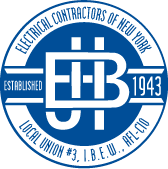How long do I need to work for a contributing employer before I am eligible for Educational and Cultural Trust Fund benefits?
In order to register for the Educational and Cultural Trust Fund classes, or enroll your children in Camp Integrity, you must be employed for at least six months by an employer(s) who contributes to the Fund on your behalf. This would include the Citizenship Responsibility course, which prepares you to serve Jury Duty, and enables you to receive the Jury Duty Benefit for any days you serve as a juror.
To be eligible for the Tuition Reimbursement Benefit, you must be employed by a contributing employer for at least three years prior to the start of the semester you submit an application for reimbursement.
College Tuition Loans are available if you are employed by a contributing employer for at least five years immediately prior to your application.
To submit an application for the Scholarship Award Program, you must be employed by a contributing employer for at least five years immediately prior to application; or a retired participant who meets the eligibility requirements.
As an eligible participant of the Educational and Cultural Trust Fund, can I pursue a certification program in a field related to the industry?
As a rule, members and spouses are eligible to receive up to a lifetime maximum of $25,000 Tuition Reimbursement for any courses successfully completed while matriculated at an accredited college. You will be reimbursed for any credits earned, which will be applied towards an Associates, Baccalaureate, Masters, Ph.D., M.D. or Jurist Doctorate Degree. However, you may apply for Technical Training Courses as long as these courses are job-related and will be used to enhance your skills for work within the industry.
To be considered for reimbursement for Technical Training Courses, you must submit the proper E&C Trust Fund forms for Technical Training to establish pre-approval before taking the Technical Training Course. Each application form to apply for reimbursement for a Technical Training Course must be completed by the member’s employer.
I have completed my Baccalaureate Degree and was reimbursed through the Educational and Cultural Trust Fund. Now I would like to receive reimbursement for a second Baccalaureate Degree in another major. Will the Fund reimburse me for these courses?
No. When a participant or a spouse completes their B.A. degree, the Fund will reimburse courses leading to the next degree level, so that the student must pursue a Masters Degree.
I borrowed through the College Tuition Loan program for last semester, and I am currently unemployed. My loan has become delinquent. Can I resume weekly deductions when I return to work? Will I be able to borrow for this coming semester?
In the event an employer fails to deduct for a given week, the borrower shall make that payment directly to the Fund. In cases where you are not employed, the maximum allowable grace period is 30 days. After this 30-day period, you are required to make monthly payments for any weeks not submitted through your employer’s payroll deductions. Subsequent loans will not be approved as long as you are in default and remain delinquent on the current loans.
The applicant must be an eligible dependent, or a legally adopted child of a participating member of Local Union No. 3, I.B.E.W.
Since the inception of the Joint Industry Board in March 30, 1943, funding for benefits has been through labor-management cooperation. The E&C benefits program is solely funded through contributions made by contributing employers to the E&C Fund on their employees’ behalf. When a participant retires from the industry, contributions on the member’s behalf and the participant’s eligibility cease, with the exception of the E&C Scholarship Program. Realizing that some retired members have College-bound dependents, the E&C Fund has extended the Scholarship Program to allow the eligible dependents of pension members, who otherwise meet the eligibility requirements, to enter the competition for a four-year Scholarship.
No. The E&C benefits program is solely funded by employer contributions under the Local Union No. 3, I.B.E.W. Collective Bargaining Agreement with employer members of the New York Electrical Contractors Association and the Association of the New York Electrical Contractors. Ask your Local Union No. 3, I.B.E.W. employee representative, or shop steward for further information regarding your benefits.
To be eligible for E&C benefits, you must be employed or be available for employment. If you are receiving workers’ compensation, the E&C classes are not available to you until your employment is resumed, or you become available for full employment.
However, the Tuition Reimbursement, Scholarship and Loan Program benefits are extended for a period of two years while you are on workers’ compensation. Should you remain on disability after the two-year period, E&C benefits cease until you return to full employment within the industry for a period of six months to one year depending on the amount of time you remained disabled. All requests for benefits go before a committee for eligibility approval.
I am currently working on a job that requires a respirator, how quickly can I be fit-tested to use a respirator?
In order to be fit-tested, you must first complete training in the use of Respiratory Protection Equipment. You will be assigned to a class based on a class pending list. When notified to take a class, you are required to complete a medical surveillance program, which includes a physical examination including a chest x-ray and a pulmonary function test. You are not permitted to take any course that requires the use of a Respirator and fit-testing without a Medical Surveillance Affidavit (M-91) form authorized by an examining physician of JIB Medical, P.C., or your personal licensed physician.
The Educational and Cultural Trust Fund offers a wide variety of OSHA classes to members free-of-charge. In classes involving licensing fees, such as the Asbestos Restricted Handler and the Asbestos Handler classes, all fees are paid by the Educational and Cultural Trust Fund to the D.O.H., D.O.L., and the D.E.P. Classes are conducted evenings at the Electric Industry Center in Flushing, Queens. Most classes require an annual refresher course.
If I do not take my annual refresher course and my license or certification expires, would I be able to be rescheduled for a refresher course at a later date?
In the case of the Asbestos Restricted Handler or the Asbestos Handler Certification Class, when your state license has expired, the D.O.H. and D.O.L. requires that you take an initial class to renew your license. Since additional fees are required for this initial class, you are required to pay a penalty of $98.50 in order to renew your state and city licenses. The respiratory and lead courses also require an annual refresher. OSHA regulations require that if you complete the Confined Space Initial Course, you must take a refresher course every two years. The confined space, initial course, and the respiratory and lead courses are offered at no charge.
I am an apprentice working on a job-site that requires OSHA training, are the OSHA classes available to me?
The Educational and Cultural Trust Fund offers classes to all eligible participants; however, apprentices should complete their apprenticeship training before requesting OSHA classes given by the Educational and Cultural Trust Fund.
My employer sent me to an outside agency to obtain an asbestos license; may I now take my refresher course through the Educational and Cultural Trust Fund?
When you submit the proper proof of certification by the N.Y.S. Department of Labor and the N.Y.C. Department of Environmental Protection, you will be put on a pending list for the refresher course. You must meet the eligibility requirements in order to register for any E&C Fund courses, and must submit the required Medical Surveillance Affidavit (M-91) form authorized by an examining physician of JIB Medical, P.C., or the member’s personal licensed physician prior to taking any OSHA classes requiring the use of Respiratory Protection equipment.






